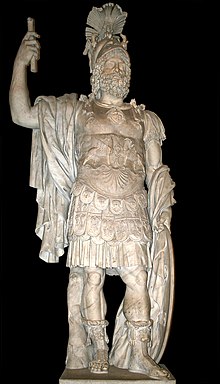
Back ذكورة Arabic পুৰুষত্ব Assamese Maskulanlıq Azerbaijani Maskulinidad BCL Мъжество Bulgarian পুরুষত্ব Bengali/Bangla Masculinitat Catalan پیاوەتی CKB Maskulinita Czech Арлăх CV

Masculinity (also called manhood or manliness) is a set of attributes, behaviors, and roles associated with men and boys. Masculinity can be theoretically understood as socially constructed,[1] and there is also evidence that some behaviors considered masculine are influenced by both cultural factors and biological factors.[1][2][3][4] To what extent masculinity is biologically or socially influenced is subject to debate.[2][3][4] It is distinct from the definition of the biological male sex,[5][6] as anyone can exhibit masculine traits.[7] Standards of masculinity vary across different cultures and historical periods. In Western cultures, its meaning is traditionally drawn from being contrasted with femininity.
- ^ a b Shehan, Constance L. (2018). Gale Researcher Guide for: The Continuing Significance of Gender. Gale, Cengage Learning. pp. 1–5. ISBN 9781535861175. Archived from the original on 19 January 2023. Retrieved 26 October 2019.
- ^ a b Cite error: The named reference
MartinFinnwas invoked but never defined (see the help page). - ^ a b Cite error: The named reference
Lippawas invoked but never defined (see the help page). - ^ a b Cite error: The named reference
Whartonwas invoked but never defined (see the help page). - ^ Ferrante, Joan (January 2010). Sociology: A Global Perspective (7th ed.). Belmont, CA: Thomson Wadsworth. pp. 269–272. ISBN 978-0-8400-3204-1.
- ^ "What do we mean by 'sex' and 'gender'?". World Health Organization. Archived from the original on 8 September 2014.
- ^ Halberstam, Judith (2004). "'Female masculinity'". In Kimmel, Michael S.; Aronson, Amy (eds.). Men and Masculinities: A Social, Cultural, and Historical Encyclopedia, Volume 1. Santa Barbara, Calif.: ABC-CLIO. pp. 294–5. ISBN 978-1-57-607774-0. Archived from the original on 19 January 2023. Retrieved 7 March 2018.